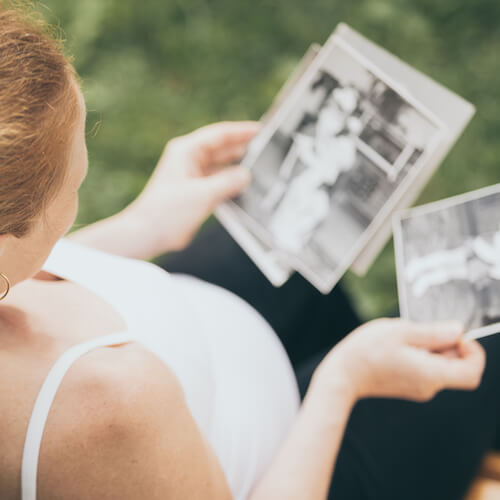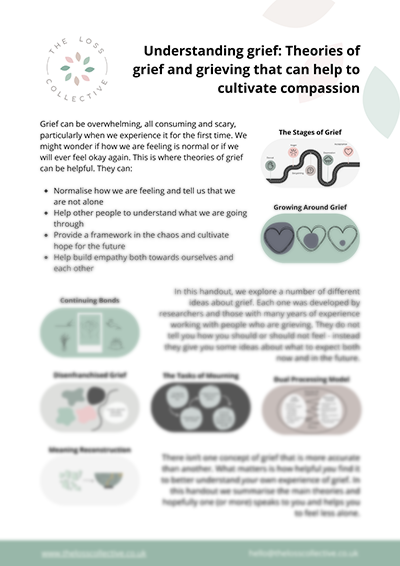I WANT TO BETTER UNDERSTAND HOW I AM FEELING

What is grief?
Grief is what happens when we lose someone or something that is important and meaningful to us. It is a normal response to the painful experience of loss and can be experienced physically, emotionally, cognitively and spiritually. It impacts how we feel, think and behave. It influences how we relate to others and the world around us.
How we will experience grief will be unique to each of us. However, because it is so all encompassing – and therefore quite frightening – in the early days, it can be helpful to understand some of the common responses that many people report.
Emotional
Grief is deeply emotional. However, the range of emotions can be unexpected and confusing. We might expect to feel sadness, but in reality, it is far more complex than this alone. Common emotional responses to loss can include:
- Intense feelings of sadness, anxiety, fear, guilt, anger, jealousy and shame. This can lead to intense feelings of panic or rage.
- Alternatively, we might experience a complete absence of any feelings. This can feel like being numb and dissociated, sometimes as though you are simply existing and on autopilot.
- Feeling lonely and disconnected from others, including your partner. You might feel as though you are the only one feeling the way that you do and that no one else could understand the depths of your emotional distress.
- It is also very common to feel helpless and hopeless about the future. It can be hard to imagine ever feeling joy or as though life will ever feel normal again.
Physical
Many people report feeling surprised at how physical the experience of grief can be. Our understanding of the mind-body associations is developing but is still often misunderstood. Knowing that these are normal and expected changes won’t make them any easier, but hopefully will help to make them less scary:
- Changes in sleep. This could be sleeping more or struggling to get to sleep or to stay asleep. You might experience nightmares or intense dreams that cause distress.
- Changes in appetite. This can be not feeling hungry at all and actually experiencing nausea at the thought of eating. Alternatively, food can become something that you are drawn to in an intense or compulsive way and you could find yourself eating significantly more than normal. Food might also taste different from usual, and it can often be hard to swallow.
- Shifts in your energy levels. You may find yourself feeling lethargic, slow and struggling to ‘get going’. At other times you might find bursts of intense energy, becoming busy and frantic and an intense sense of restlessness.
- Your body might ache, and it can be common to experience physical pains or feeling generally unwell. If anything persists, it is important to get this checked out by a healthcare professional.
- After losing a baby, many people report continuing to feel movement or kicks as though they are still pregnant. Often referred to as ‘phantom kicks’, this can be particularly distressing.
Behavioural
It can feel as though you have changed completely in the early stages of grieving. You might find yourself acting or responding to things in very unexpected ways that do not seem to align with who you were before your loss:
- Being tearful a lot of the time or conversely not being able to cry at all.
- Withdrawing from activities that you would normally do, finding it hard to leave your house or even your bed.
- Avoiding people and places, particularly if there is a concern about seeing someone or something that you worry might make you feel very overwhelmed or trigger difficult memories. For example, avoiding places where there are babies or pregnant people can be very common following baby loss.
- Becoming over-active and keeping very busy, often to distract yourself from thinking and feeling.
- Being unable to do anything at all, feeling stuck and not able to get going at all.
Cognitive
The way in which we think, the types or patterns of our thoughts can change drastically following loss. We might feel a loss of control and overwhelm that is unfamiliar and therefore very scary. It can alter, or even shatter, our beliefs about ourselves, other people or the world. For example, it is very common to have thoughts such as ‘I am not safe’ or ‘the world is not safe’. This can leave us feeling very worried about bad things happening to other people we care about. Or we might have thoughts such as ‘life is cruel and unfair’ and we might have feelings of anger or resentment. Again, this is very normal.
This can manifest in many ways, for example:
- Patterns of thinking such as ruminating and going over and over events in your mind.
- Blaming and critical thoughts.
- Worrying and distressing thoughts and images about other bad things happening.
- Experiencing brain fog and poor concentration, finding it hard to focus on anything (e.g. conversations, TV and reading).
- Becoming easily overwhelmed by everyday tasks that before you wouldn’t have thought twice about.
- Experiencing intrusive thoughts, images or memories of your loss.
- Having nightmares.
- Hearing, seeing or sensing the person who has died.
Whilst these are all normal and expected experiences, if you find that they are unmanageable and persist over an extended period of time, please do reach out for help. These are normal and expected experiences, but you should not suffer alone.

Understanding grief in context
How we experience grief is very unique to us – because we are all unique individuals. No one of us arrived at loss and grief as a blank canvas. We are already carrying a lot of previous ‘stuff’ that makes us who we are. Plus, the losses we experience will have specific meaning to us. There will be context. Therefore, we may grieve different people or events differently.
So, what might influence the way in which we experience grief?
It is really important to acknowledge that the way in which we experience grief will be influenced by many different factors including:
- Our relationship with the person who died
- The context of their death (e.g. whether it was sudden and unexpected, their age when they died, the way in which they died)
- Our own personality and temperament as well as the ways in which we have learnt to cope with (or survive) emotional distress in the past
- Previous losses or trauma that we have experienced
- Our culture
- Societal expectations
- Our religious or spiritual beliefs
Our loss, and our grief, will be influenced by all of these things – so it would simply be impossible to expect us to respond in the same way to others. This does not mean we are grieving in a ‘right’ or ‘wrong’ way – we are grieving in the way that makes sense for us, at this moment in time.
Our loss is our own. Our grief is our own. And this means that how we respond to one loss may also be very different to how we respond to another. Each loss will have its own place in the story of our lives.
This can be hard when other people seem to place expectations of how or how long we grieve. Remember that there are so many misconceptions and myths that exist and that these people are likely to be influenced by these. You are allowed to grieve in the way that feels right for you.
Free Download
Understanding grief: Theories of grief and grieving that can help to cultivate compassion

How we can help
For further information on resources and sources of support, including talking therapies and peer support, please have a look through our Resources section.
Our directory includes a huge range of resources including charities, books, podcasts and where to find talking therapy
courses and webinars
Our online courses and webinars are developed and delivered by healthcare professionals and qualified experts in their field. (Coming soon)
Single or packages of sessions with Dr Michelle Tolfrey to help you work out exactly what you need.





